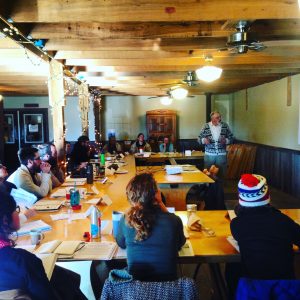 “Land is our partner, not our servant.” –Dave Bishop, PrairiErth Farm
“Land is our partner, not our servant.” –Dave Bishop, PrairiErth Farm
This simple phrase, tucked into a presentation to our Farm Beginnings students a few weeks ago, could well serve as the foundation of our efforts to reform how we grow food.
When a farmer treats the land as a servant, the land remains thwarted. Like any stifled creature, no matter how large it may be, it will slowly retreat from this neglect and become uncooperative.
When a farmer treats the land as a partner, they commit together to a purpose while also supporting each other’s individual motives. We cannot produce food without the land. Thankfully, the land provides amply to this cause, because the land wants only to grow, and as committed partners we must support it in its relentless ambition.
When a farmer treats the land as a servant, the relationship between farmer and land becomes obtuse and malevolent. A year of conditional commitment, with attention paid only when something is needed, would sour any relationship.
When a farmer treats the land as a partner, the relationship between farmer and land is allowed to deepen. This is why the planting of trees is more than just a return to native ecology. It’s a matter of love and respect for the land, a literal sign of commitment or, as they say, putting down roots. And all those fauna and flora in the soil and flying overhead, when allowed to thrive, are the countless interminable threads that weave a strong partnership together.
When a farmer treats the land as a servant, the farmer grows while the land shrinks. As the land shrinks, the farmer will resort to more drastic treatment so as to keep growing but, in time, the land will have nothing left to give and the farmer will move on.
When a farmer treats the land as a partner, both parties can grow. The commitment and care required to maintain the relationship can be trying, but the reward will be far greater. The farmer does not grow on the land. The farmer grows alongside and among the land, and each partner nurtures the other.


